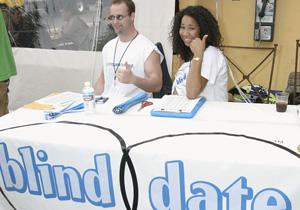Refusing to refer to its serving staff as handicapped, blind, visually impaired or whatever the “politically correct” term is, Dans le Noir? (translated as ‘In the Dark?’) is the place where those who cannot see have been given a sense of purpose. Relishing in their newfound “usefulness,” they become the guides and we the blind.
Originally launched in Paris, with franchises in London and Moscow, 150,000 people have already visited the London and Paris locations. For a limited time, the restaurant is open in Warsaw “because this cosmopolitan city is the capital of the leading country of ‘New Europe,’” the concept has been called “challenging” and “the most surreal experience I have ever had.” Indeed, that it is. And much, much more.
A Sensorial Adventure
So. What exactly is Dans le Noir? Definitely not complete sensorial deprivation since, by virtue of being deprived of sight, other senses are enhanced, which is the aim of the concept: “the awakening of largely dormant senses. we suddenly become aware that vision preconditions all our sensations in life.” Under this premise, Dans le Noir? urges us to close our eyes and “see” without distinction for race, colour, age or handicap.“This particular situation, where we cannot see or be seen by others, radically transforms how we relate to (people).” ides aiming for a sense of true conviviality where communication becomes more spontaneous, more intense and more real, the concept also urges us to raise our awareness and hopefully to become more sensitive and humane toward the physically impaired by becoming temporarily blind ourselves. Our sense of touch is immediately enhanced, as we, the newly blind, must place our hand over the right shoulder of the person in front of us beforebeing guided to table. Thus the texture of a shirt or the roundness of a shoulder that would’ve otherwise been unnoticed, becomes “tactically” imprinted in the mind.
Otherwise unremarked smells become sharply defined and clearly distinguishable one from the other. Stepping behind the first curtain, I became suddenly aware of our guide’s perfume (Gaja, our guide throughout the experience, is not completely blind yet, though she suffers from a progressive deterioration of the eye called Retinitis Pigmentosa that eventually will deprive her of her eyesight). After the second curtain, I began smelling the food and could actually feel my nostrils flaring as I identified each nuance, each texture, and even the warmth of the dishes being served. Layered onto this olfactory overload was the din of conversation and laughter. The sense of optimism and spontaneity that I could detect in the patrons’ voices became the beacon that pulled me toward my table.
A Touching Experience
Beneath my hand, Gaja guided us confidently through the dark as we meandered across the dining hall. At intervals she asked us how we were doing, and the joyousness in her voice was reassuring. Upon reaching our table, Gaja unself-consciously took my hand to place it on the back of a chair. I sat and reached with my hand to touch the thigh of the person sitting next to me. “I’m here,” she said, seemingly not alarmed because I had just touched her leg. Next, I placed my hands on the table to locate the silverware, napkin, glasses and bread basket, then reached across to take my friend’s hands in mine. “I’m here,” I said, smiling broadly. I could feel her smiling back at me when she squeezed my hands.
From then on, we had to rely on our sense of touch, of smell, of hearing, to get our bearings. When the food arrived, I was surprised by how distinctively everything tasted. Upon our arrival, we were given three choices: Polish Menu, Gourmet Menu or Discovery Menu. Gourmet I didn’t choose because it consists of a starter, two entrees, and dessert. My friend went for Discovery and I tried the Polish Menu. For starters, I got a smoked salmon salad with herring cream and tapioca over a bed of beets, tomato and cucumber, very tasty and fresh, though I found the salmon a little bit too salty. For my main course, I was offered a filet of baked perch with mushroom sauce, baked potatoes with beet cream, string beans and cabbage. My friend had a meat dish and found it satisfying and very tasty. As food is normally such a visual experience, it was disconcerting not being able to see what I ate, but the way everything tasted more than compensated for that, except it was sometimes hard to cut things or put them on my fork —at least twice I put an empty fork in my mouth.
After dessert, which for me was a very generous slice of apple pie with rhubarb and cinnamon sauce, vanilla ice cream, and strawberry and kiwi tarts, we lingered in the dark for several moments waiting for Gaja, who returned to deliver us back into the light. Being able to see again was at the same time shocking and comforting. I walked back into the light feeling that my soul had been uplifted and that I perhaps am a little bit wiser now that I realise how much our eyes can deceive us.
Overall, I feel that this was a unique experience; I was seduced by smell, by taste, by the feel of things. My friend told me that she had kept her eyes closed all throughout, then someone else said that he had his eyes open while cutting his food and eating, but afterwards he closed them. I had my eyes open all throughout and even kept my glasses on, which my friend found decidedly funny, but even in the dark lines can be blurred.


